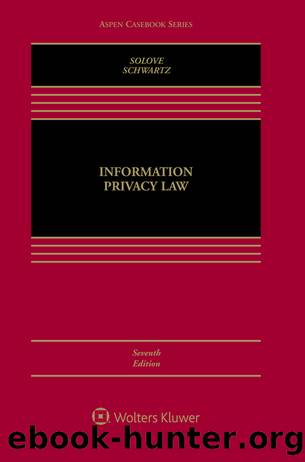Information Privacy Law by unknow

Author:unknow
Language: eng
Format: epub
ISBN: 9781543827262
Publisher: Wolters Kluwer
Published: 2020-09-15T05:00:00+00:00
3 .CONSTITUTIONAL REQUIREMENTS OF PUBLIC ACCESS
The Common Law Right to Access Public Records. As the Supreme Court held in Nixon v. Warner Communications, Inc., 435 U.S. 589 (1978): âIt is clear that the courts of this country recognize a general right to inspect and copy public records and documents, including judicial records and documents.â The right to access public records is justified by âthe citizenâs desire to keep a watchful eye on the workings of public agencies, and in a newspaper publisherâs intention to publish information concerning the operation of government.â Thus, under the common law, the Court concluded, there is a general right to access public records and court records. The Court noted that the right to access is not absolute.
Court Records. Courts have a long tradition of allowing open access to court records. In Nixon v. Warner Communications, Inc., 435 U.S. 589 (1978), the Supreme Court stated: âEvery court has supervisory power over its own records and files, and access has been denied where court files might have become a vehicle for improper purposes.â Access to court records is âbest left to the sound discretion of the trial court, a discretion to be exercised in light of the relevant facts and circumstances of the particular case.â In Seattle Times Co. v. Rhinehart, 467 U.S. 20, 33 (1984), the Court held that âpretrial depositions and interrogatories are not public components of a civil trial. Such proceedings were not open to the public at common law, and, in general, they are conducted in private as a matter of modern practice.â
The First Amendment Right to Access. The First Amendment requires that certain judicial proceedings be open to the public. In Globe Newspaper v. Superior Court, 457 U.S. 596 (1982), the Supreme Court articulated a test to determine whether the First Amendment requires public access to a proceeding: (1) whether the proceeding âhistorically has been open to the press and general publicâ and (2) whether access âplays a particularly significant role in the functioning of the judicial process and the government as a whole.â The court in Globe concluded that the First Amendment requires public access to criminal trials, and the government can deny access only if âthe denial is necessitated by a compelling governmental interest and is narrowly tailored to serve that interest.â According to the Court, the First Amendment right to access extends to voir dire in a capital murder trial. Press-Enterprise Co. v. Superior Court (âPress-Enterprise Iâ), 464 U.S. 501 (1984). It also extends to pre-trial proceedings. Press-Enterprise Co. v. Superior Court (âPress-Enterprise IIâ), 478 U.S. 1 (1986).
Privacy of Litigants and Jurors. A court can permit plaintiffs to proceed under a pseudonym, although âit is the exceptional case in which a plaintiff may proceed under a fictitious name.â Doe v. Frank, 951 F.2d 320, 323 (11th Cir. 1992). Courts can also provide for jurors to remain anonymous. Is such anonymity appropriate?
Consider the case of Juror Number Four. In a well-publicized criminal trial against Tyco International executive L. Dennis Kozlowski,
Download
This site does not store any files on its server. We only index and link to content provided by other sites. Please contact the content providers to delete copyright contents if any and email us, we'll remove relevant links or contents immediately.
